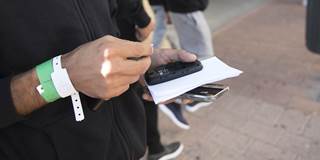Refugees have long been excluded from financial services, leaving them struggling to integrate into host economies. But new technologies have made the lack of an identity card, loan collateral, or a fixed address irrelevant, and the world's displaced people may be only the first to benefit.
KAMPALA – Every minute, on average, 31 people are displaced – forced to leave their jobs, homes, and even their families. These refugees often arrive, after arduous journeys, in new countries with no money or identification, and few possessions. Yet, far from securing a safer, more prosperous future, they often find themselves marginalized, excluded, and even demonized, denied opportunities to integrate into their host societies or contribute to the local economy. One straightforward way to empower refugees is to give them access to financial services.

KAMPALA – Every minute, on average, 31 people are displaced – forced to leave their jobs, homes, and even their families. These refugees often arrive, after arduous journeys, in new countries with no money or identification, and few possessions. Yet, far from securing a safer, more prosperous future, they often find themselves marginalized, excluded, and even demonized, denied opportunities to integrate into their host societies or contribute to the local economy. One straightforward way to empower refugees is to give them access to financial services.